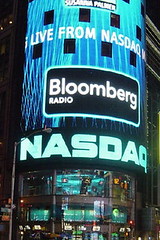 The stock market has often been cited as being the the shining example of how capitalism works - apparently the free trade and the constant change and flow of wealth and materials the world over means that everything works according to the best examples of capitalism. Supply, demand, financial deals, etc. can chase each other across the world multiple times over, without a single physical transaction taking place.
The stock market has often been cited as being the the shining example of how capitalism works - apparently the free trade and the constant change and flow of wealth and materials the world over means that everything works according to the best examples of capitalism. Supply, demand, financial deals, etc. can chase each other across the world multiple times over, without a single physical transaction taking place.
But all is not perfect in this virtual world -- apparently the stock market and the ideals that lie beneath its operations are quite the anti-thesis of capitalism, and give rise to irrational concepts, such as "private equity". Some excerpts from the Slate article...
All of this depends, though, on the assumption that the stock market sets the right price for
shares of big companies. But a whole separate part of corporate finance is based on the assumption that those prices are wrong. These special deals used to be called leveraged buyouts. Now they're called "private equity." The details are different, but the principle is the same. Private investors buy a company from its public stockholders. They have a letter from an investment bank saying the price is a fair one. They usually have the support of management, or they actually are the management. The public stockholders have little choice. But time and again—surprise, surprise — the investment bank turns out to be wrong. The company is actually far more valuable! (And any bank that can't be counted on to get this wrong will not be in this profitable line of work for long.) Soon, the company is sold at a large profit, either to another company or back to the public.
So, free-market capitalism has decreed three different values for this company. One is set by the stock market: the value of all the company's outstanding shares or "market capitalization." One is what the private investors are offering—usually a bit more than the market cap. And one is what the private investors sell the company for a blink of an eye later—which is usually a lot more than the other two. Which of these numbers is the true capitalist price? Which one represents the most sublime interaction of supply and demand?
Hmm...so the "free-market" idea is actually swindling the general public ? Here is the counter argument stating that it is not a swindle...
Defenders of this procedure say it's not that the stockholders have been swindled. It's that the company is actually far more valuable in private hands because managers—even the same managers as before—can manage far better without the constraints of public ownership, with its meddlesome stockholders and nettlesome regulations.
Well, but if the deals are fine and perfectly legal, then what is the whole point of having a stock market in the first place ? The public that has invested in it does not necessarily get the best possible price for their investment, and it seems as if companies are getting a better deal than what is publicly possible on the stock market. Doesn't this make the whole concept of the stock market a farce ?
But the big question is this: Either the stock market is a fraud on the public, or these deals that dominate the business pages are a fraud on the public. Which is it?
Well, we shall have to see how far this whole concept of the stock market and "free trade" will go...perhaps if the general public were to realise the true consequences of these "trades" then the whole system might collapse, taking with it a large number of world economies that are often reliant only on the deals that happen through various stock markets.
_________________________

No comments:
Post a Comment